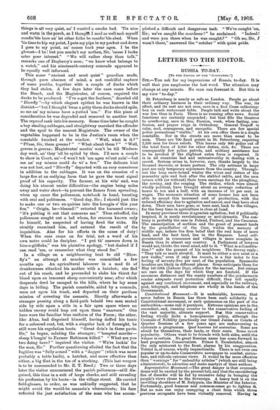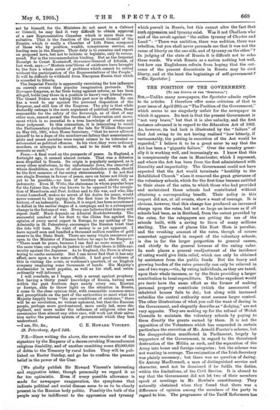LETTERS TO THE EDITOR.
RUSSIA TO-DAY. ,
[TO THE EDITOR OP THE "SPECTATOR."] Szn,—You ask for my impressions of Russia to-day. It is well that you emphasise the last word. The situation may change at any minute. No man can forecast it. But this is my view "to-day."
St. Petersburg is nearly as safe as London. People go about their ordinary business in their ordinary way. The war, its effect, and its cost are not seen, save in a Rod Cross collecting- box on each restaurant table. People talk and write about the war less than in Paris. There is no running after news.. Social functions are certainly suspended; but that fills the theatres to overflowing, save in this, Passion, week, when fasting, con- fession, and prayer reign in Orthodoxy. General Trepoff , is calm, cool, courageous, and energetic. There are few special police precautions " visible." At his own office there is a single constable. Nor in the streets are more than usual to be seen. There are 700 fixed points in St. Petersburg, requiring 2,100 men for three reliefs. This leaves only 900 police out of the total force of 3,000 for other duties, sick, &c. There are consequently few police patrols, and military assistance has to be invoked if the slightest extra force is required. It is in all countries bad and untrustworthy in dealing with a crowd. Serious crime is, however, rare, thanks largely to the licensed dvorniks, or house porters. The city artisans in large part are only temporary sojourners from the country. Through- out the long snow-bound winter the wives and sisters of the peasantry spin and look after the stabled cattle, and the men return with (or without) their town earnings for the ploughing, the sowing, and the reaping. The strikes, which were almost wholly political, have brought about an average reduction of hours to ten and a half, with an increase of 10 per cent. in wages. The economic situation of some houses has not been able to accept this increased cost of production, with the reduced efficiency due to agitation and unrest, and they have shut down. Their men have gone, or been sent, back to the villages, for the busy time in agriculture is close at hand.
In many provinces there is agrarian agitation; but if politically. inspired, it is rarely revolutionary or anti-dynastic. The con- trary is probably the case in Poland, Finland, and the Caucasus. The emancipation of serfdom and the grant of peasant lands by the grandfather ,of the Czar, within the memory of middle age, induce the firm belief that the real hope of more land, and the best land, lies in the Emperor. Local self- government in communes and villages is more complete in Russia than in almost any country. A Parliament of lawyers would not, thinks the rural mind, add to it. " What is a Constitu- tion ? " asks the peasant of his neighbour. The drowsy reply :. "They talk so much about it. It mast be either a new saint or a new vodka," even if only ben trovato, is a fair index to the feeling of seventy-five per cent. of the population. Spasmodic troubles are likely in different places. Some anticipate them for May lst/13th (Labour Day), others for the harvest. But risings_ are rare on the days for which they are foretold. If the enormous distances and the scanty numbers of the gendarmerie render adequate rural protection difficult, -they tell equally against any combined movement, and especially as the railways, post, telegraph, and telephone are wholly in the-hands of the, Government.
Constitutional Movement.—It is undeniable, however, that never before in Russia has there been such solidarity in a Constitutional movement, or such quiescence on the part of the authorities,—some call it paralysis. Extreme opinions are in the ascendant, and, running counter to the conservative feeling of the vast majority, alienate support. But this conservative feeling wholly lacks a homogeneous policy, although the Councils of Nobility (practically our Grand Juries or Courts of Quarter Sessions of a few years ago) are endeavouring to elaborate a programme. (Not homines tot sententiae. Some are afraid for themselves, their lands, or their rents. Some covet popularity. Others want to be friends with both sides, until the winner is certain. No great Russian name has come forward to .
lead progressive Conservatism. Prince S. Treubetzkoi; almost the only aristocrat to the front, alarms by, his exaggeration.
Tolstoi is, of course, wholly impracticable. There is not even one popular or up-to-date Conservative newspaper to combat, carica- ture, and ridicule extreme views. It would be far more effective than "warnings" for "unhealthy articles" (which are still being administered), to advertise and make martyrs of their authors.
Representative Movement. —The great danger is that overconfi- dence will be excited by the present lull, and that the smouldering fire of disorder will be fed by excessive delay in bringing the people's views closer to the Sovereign. A heavy task is on the unwilling shoulders of M. Bulyguin, the Minister of the Interior. Fortunately, .good humour and common-sense go to lighten -it. But no man can enjoy occupying a chair, from which three- previous occupants have been violently removed. Having to act by himself, for the Ministers do not meet in a Cabinet or Council, he may find it very difficult to obtain approval of a new Representative Chamber which is more than con- sultative. That is the function of the present Council of the Empire, which is really a Chamber of Life Peers, composed of those who by position, wealth, conspicuous service, are leading men in the Empire. Their duty is to examine and report on proposed laws, but not to initiate or legislate, only to recom- mend. Nor is the recommendation binding. But as the Imperial Rescript to Count Koutaisoff, Governor-General of Irkutsk, of last week, says :—" Modern conditions of existence have brought to the fore a whole series of problems which cannot be solved without the participation of the Representatives of the People." It will be difficult to withhold from European Russia that which is accorded to Siberia.
The Imperial Family is apparently exercising far less influence on current events than popular imagination pretends. The Dowager-Empress, so far from being against reform, as has been alleged, holds (say those in a position to know) very liberal views. The Grand Dukes are taking little part now in affairs. No one has a word to say against the personal disposition of the Emperor, and still less of the Empress. The pity is that while dastardly outrage is the main argument of political reform, those responsible for the safety of the Sovereign, as of that of any other man, cannot permit the freedom of observation and move- ment which is so essential to a true knowledge of events and clear judgment. In this connection, it is interesting to recall the Parliamentary declaration of the late Sir William Harcourt on May 6th, 1881, when Home Secretary, " that he never allowed himself to be a dupe of the mischievous fallacy that assassination plots and secret societies were venial crimes to be tolerated or extenuated as political offences. In his view, they were ordinary murder% or attempts to murder, and to be dealt with in all respects as such." Peace.—.4. final word on the prospects of peace. In England, a fortnight ago, it seemed almost certain. That was a delusion soon dispelled in Russia. Its origin is popularly assigned, as is every other misfortune, to the unfortunate Jews, the removal of whose disabilities, as those of other non-Orthodox creeds, should be the first measure of far-seeing statesmanship. I do not find one single Russian in favour of peace, save on terms not likely as yet to be possible,—no loss of territory and, above all, no indemnity. Even M. Witte, the statesman in whom popular hope for the future lies, who was known to be opposed to the occupa- tion of Manchuria and Port Arthur and to the war, and who, like Count Lamsdorff, makes no secret of his desire for peace, would never consent to the paying, for the first time in the Empire's history, of an indemnity. Russia, it is urged, has been accustomed to defeat in the earlier stages of a campaign and to a subsequent change in the fortune of war. Every one believes that history will repeat itself. Much depends on Admiral Rozhdestvensky. The successful conduct of his fleet to the China Sea against the opinion of every naval expert in Europe, to say nothing of the Admiralty in St. Petersburg, encourages the Russian trust that the tide will turn. No want of money is as yet apparent. I have myself seen and handled a thousand million roubles of gold reserve in tho State Bank. There are many virgin resources yet open to the Minister of Finance before he says to the Emperor : " There must be peace, because I can find no more money." At the same time, one ought in justice to add that there is little ani- mosity against the Japanese. As to England, the Press is always trying to excite animosity. But I can never find that it has any effect, save upon a few minor officials. I had good evidence of this in visiting the arias, or workmen's quarters, of an English company employing some thousands of hands. His Majesty's Ambassador is most popular, as well as his staff, and extra- ordinarily well informed.
I will conclude, as I began, with a caveat against prophecy. But having a thirty years' knowledge of Russia, having seen within the past fourteen days nearly every one, Russian or foreign, able to throw light on the situation in Russia, I come to the clear opinion that, with reasonable common-sense and promptitude on the part of the authorities to meet what his Majesty happily terms "the new conditions of existence," there will be no revolution, no violent upheaval, but that the Russian people, perhaps more good-natured, more easily led, more dis- ciplined, and more under the influence of religious rites and ceremonies than almost any other race, will work out their salva- tion under the paternal system of government which they best understand.
P.S.—Since writing the above, the news reaches me of the signature by the Emperor of a decree revoking Nonconformist religions disability, and of another remitting some 28,000,000 of debts to the Treasury by rural bodies. They will be pub- lished on Easter Sunday, and go far to confirm the peasant belief in the power of the Czar.
[We gladly publish Sir Howard Vincent's interesting and suggestive letter, though personally we regard it as far too optimistic. Even if every possible allowance is made 'for newspaper exaggeration, the symptoms that indicate political and social disease seem to us to be clearly present in the Russian body politic. Possibly the bulk of the people may be indifferent to the oppression and tyranny
which prevail in Russia, but this cannot alter the fact that such oppression and tyranny exist. Was it not Chatham whd said of the revolt against " the sullen tyranny of Charles and Laud " : " There was ambition, there was sedition, there was rebellion, but you shall never persuade me that it was not the cause of liberty on the one side, and of tyranny on the-other" P In judging of the state of Russia it is difficult not to echo these words. We wish Russia as a nation nothing but well, but how can Englishmen refrain from hoping that the out- come of the present discontents in Russia may be civil liberty, and at the least the beginnings of self-government P —ED. Spectator.]











































 Previous page
Previous page